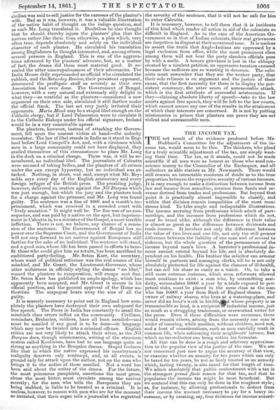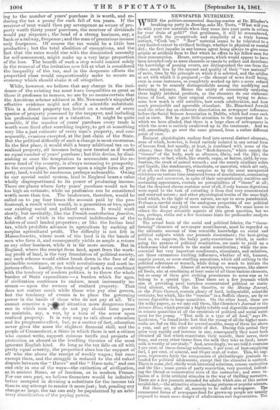THE INCOME TAX. T HE net result of the evidence produced
before Mr. Hubbard's Committee for the adjustment of the in- come tax, would seem to be this. The thinkers, who plead for a truly scientific adjustment of the tax, are simply wast- ing their time. The tax, as it stands, could not be made scientific if all men were as honest as those who send con- science money to the Chancellor of the Exchequer, and all collectors as able statists as Mr. Newmarch. There would still remain an intractable residuum of doubt as to the true proportion between the respective security of various incomes. It is easy enough to make a distinction between income from law and income from annuities, revenue from funds and re- venue derived from trades and professions. But beyond that point it is practically almost impossible to classify, and within that division remain inequalities of the most mon- strous kind. To take single and indisputable illustrations. The income accruing from professions which admit of part- nerships, and the incomes from professions which do not, must be taxed alike, although the difference in their value is almost as great as the difference between dividends and trade income. It involves not only the difference between the value of two lives and one life, not only the still greater difference between the liability of one man and of several to sickness, but the whole question of the permanence of the income beyond men's lives. A barrister's professional in- come cannot extend beyond his life, and is absolutely de- pendent on his health. His brother the solicitor can armour himself in partners and managing clerks, till he is not only absolutely protected for life against the chances of ill-health, but can sell his share as easily as a watch. Or, to take a still more extreme instance, which even reformers allowed must continue to exist: a man who, by unremitting assi- duity, accumulates 10001. a year by a trade exposed to per- petual risks, must be placed in the same class as the man who has 10001. a year from Bank of England shares. The owner of railway shares, who lives at a watering-place, and never did an hour's work in his life d whose property is as transmissible as land, is a recipient industrial income, just as much as a struggling tradesman, or overworked writer for the press. Even if these difficulties were overcome, there would remain others, arising from the necessity one man is under of insuring, while another, without children, need not, and a host of considerations, such as men carefully mark in common life, when estimating their neighbours' income, but which no tax-collector can bring within his formulas. All that can be done is a rough and arbitrary approxima- tion to the popular view of the justice of the case. We are not concerned just now to argue the accuracy of that view, or examine whether an annuity for ten years which can only be taxed for ten years, be not as fairly treated as an annuity which, lasting twenty, is also taxed for that length of time. We admit absolutely that public contentment with a tax is the strongest prima facie reason for that tax, and that to popularize the income tax might be most beneficial. But we contend that this can only be done in the roughest style; as, for instance, by allowing professionals to deduct from their income the amount necessary to pay for a heavy in- surance, or by creating, say, four divisions for income accord- ing to the number of years' purchase it is worth, and re- ducing the tax a penny for each fall of ten years. If the receiver of rent would then pay sevenpence as owner of pro- perty worth thirty years' purchase, the receiver of dividends would pay sixpence ; the head of a strong business, say, a bank or a railway, fivepence ; and the man of precarious income only fourpence. Of course the tax would be a little less productive ; but the total abolition of exemptions, and the fact that the rates would rise with the diminished necessity for self-assessment, might make up a very large proportion of the loss. The benefit of such a step would consist solely in the removal of the irritation now felt at what is considered the inequality of the tax, and in the desperate efforts the propertied class would unquestionably make to secure an economy which should shake it off altogether.
While, however, we believe that any change in the inci- dence of the existing tax must leave inequalities as great as those it professes to remove, we are by no means certain that the American scheme adduced in Mr. Newmarch's singularly effective evidence might not offer a scientific substitute. This is a direct property tax, levied on a return of every species of property possessed by the taxpayer, and including his professional income at a valuation. It might be quite possible, if the number of years' purchase every trade is worth were fixed after searching inquiry, to get at something very like a just estimate of every man's property, and con- sequently, evasions excepted, at the just claim of the State. But the political difficulty of such a change is most enormous. In the first place, it would shift a heavy additional tax on to realized property, all incomes being now treated as if worth an equal number of years' purchase ; but this device, by dimi- nishing at once the temptation to accumulate and the re- serve fund of the country, is always menacing to prosperity. In the second place, the pressure upon a single form of pro- perty, land, would be enormous, perhaps unbearable. Owing to our special social system, land in England bears a value wholly disproportioned to its power of producing income. There are places where forty years' purchase would not be too high an estimate, while no profession can be considered worth more than ten. The landowner, therefore, would be called on to pay four times the amount paid by the pro- fessional, a result which would, in a generation or two, upset our existing social and political system. It would work slowly, but inevitably, like the French contribution fonciere, the effect of which is the universal indebtedness of the holders of small landed properties ; or like the Indian land tax, which prohibits advance in agriculture by sucking all surplus agricultural profit. The difficulty is not felt in Massachusetts, where most of the land is in the hands of men who farm it, and consequently yields as ample a return as any other business, while it is far more secure. But in England, where the receipt from land, apart from the work- ing profit of land, is the very foundation of political society, any such scheme would either break down in the face of an invincible resistance, or act with revolutionary and most in- jurious effect. Lastly, the tendency of such a tax combined with the tendency of modern politics, is to throw the whole burden of State expenditure —a burden which for ages, if civilization continues to endure, must incessantly in- crease — upon the owners of realized property. That does not matter much while those who pay also govern, but the tendency of events is to place the governing power in the hands of those who do not pay at all. We cannot conceive a pal situation more dangerous than one in which men do not pay should have power to maintain, say, a war, by a turn of the screw upon realized property. It is very easy to talk about education and its progressive effect, but, as a matter of fact, education never gives the mass the slightest financial skill, and the people of Connecticut, a Sthte in which there is not a citizen who cannot write, support ruinous tariffs and projects of protection as absurd as the levelling theories of the most ignorant English hind. So long as the tax falls on all with pretty equal severity, the propertied class has the support of all who rise above the receipt of weekly wages ; but once exempt them, and the struggle is reduced to the old naked dispute between the " Haves" and the " Have note," and can end only in one of the ways—the extinction of civilization, as in ancient Rome, or of freedom, as in modern France. For our own part, we believe financiers would be infinitely better occupied in devising a substitute for the income tax than in any attempt to render it more just ; but, pending any change so large, the tax can only be. popularized by an arbi- trary classification of the paying power.































 Previous page
Previous page